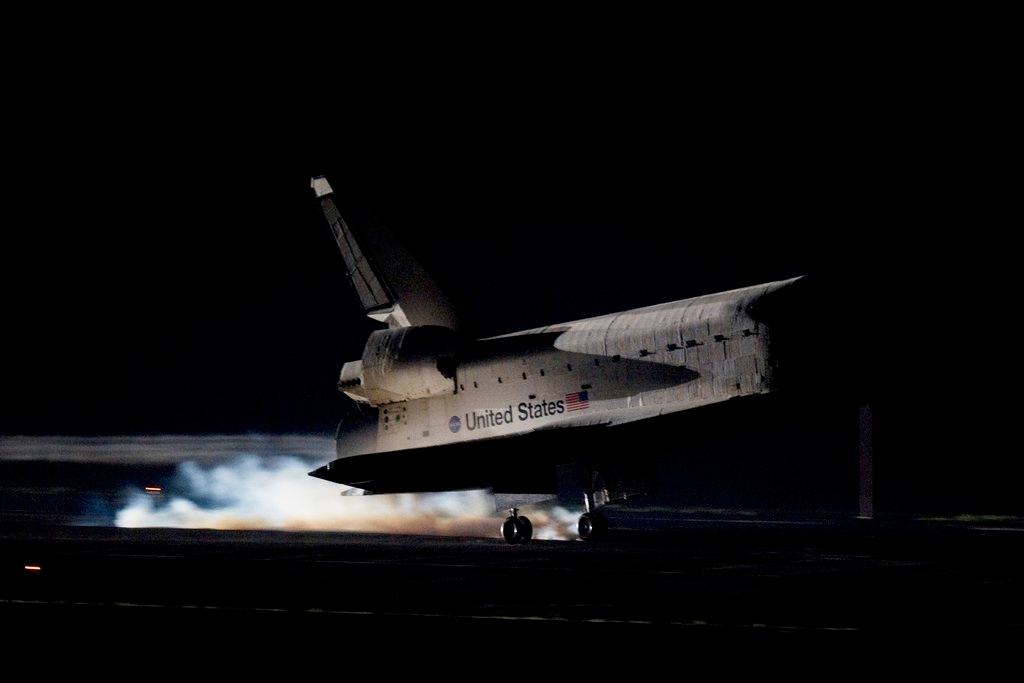Mission complete: U.S. shuttle Atlantis lands for last time
The Atlantis space shuttle landed early Thursday, July 21, 2011 at Kennedy Space Center in Florida, ending the 30-year U.S. shuttle program. This last voyage for Atlantis lasted 13 days in space.
The U.S. shuttle Atlantis has landed for the last time, marking the end of NASA's 30-year space shuttle program.
The shuttle and its four-member US crew landed safely at Kennedy Space Center at 5.56am local time, 42 years after U.S. astronaut Neil Armstrong became the first person to step foot on the Moon as part of the Apollo 11 mission, AFP reports.
It was a moving moment in history. Reuters reports:
"Commander Chris Ferguson gently steered the 100-ton spaceship high overhead, then nose-dived toward the swamp-surrounded landing strip at the Kennedy Space Center, a few miles from where Atlantis will go on display as a museum piece. Double sonic booms shattered the predawn silence around the space center, the last time residents will hear the sound of a shuttle coming home.
"Mission complete, Houston," Ferguson radioed to Mission Control.
Astronaut Barry Wilmore from Mission Control answered back, "We'll take this opportunity to congratulate you Atlantis, as well as the thousands of passionate individuals across this great space-faring nation who truly empowered this incredible spacecraft, which for three decades has inspired millions around the globe."
The world's astronauts will now have to rely on Russian Soyuz rockets for any trips to the International Space Station.
"America is not going to stop exploring," shuttle commander Chris Ferguson said. "God bless the United States of America."
Thousands of spectators gathered to greet the shuttle as it came home to perfect pre-dawn weather in Florida, having completed a 13-day cargo run to the International Space Centre, AFP reports.
The first shuttle flight to space lifted off on April 12, 1981.
Columbia exploded in 2003 and Challenger was destroyed in 1986 in accidents that killed a total of 14 crew members.
Those disasters left only three in the space-flying fleet and Enterprise, a prototype that never flew in space. The quartet will become museum pieces in the coming months.
The astronaut corps now numbers 60, compared with 128 in 2000, and thousands of people are being laid off from Kennedy Space Center, AFP reports.
But NASA chiefs say future missions to deep space should revive hope in the US program.
"We have just not done a good job of telling our story. NASA is very busy," the agency's administrator Charles Bolden told CNN.
"The president said to us, 2025 for an asteroid and 2030 to Mars. We have a lot of work to do ahead."
A commercial launcher and capsule built by a private corporation in partnership with NASA may be ready to carry crew members as early as 2015.
The story you just read is accessible and free to all because thousands of listeners and readers contribute to our nonprofit newsroom. We go deep to bring you the human-centered international reporting that you know you can trust. To do this work and to do it well, we rely on the support of our listeners. If you appreciated our coverage this year, if there was a story that made you pause or a song that moved you, would you consider making a gift to sustain our work through 2024 and beyond?
